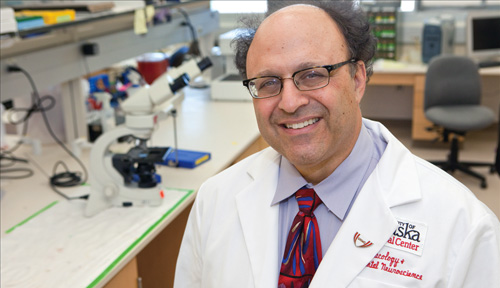Interdisciplinary teams, increased collaboration and connecting with UARC hold key to future
The state of biomedical research in 2013 is quite Dickensonian.
These should be the best of times. We have seen a striking advancement in knowledge of biology, both in health and disease. The methods and technologies available give researchers the means to continue this accelerated growth, enabling us to further understand, prevent and treat disease.
However, the decrease in funding for this work from almost all sources can appear to make this the worst of times.
We are taking a multifaceted approach to this dilemma.
First, basic research is essential to progress. The National Institutes of Health recognizes this, with a continued commitment of more than half of the NIH budget devoted to basic research.
In order to be successful in our sciences and compete for these funds, interdisciplinary research teams are needed, backed by the increasingly complex technologies and necessary infrastructure to perform this work. Numerous programs at the College of Medicine, other UNMC colleges, the University of Nebraska, and at the state level are being utilized to build these teams and provide the equipment and skills needed.
Second, the ability to translate these findings to the clinic is a roadblock for all. The sobering 80 percent failure rate of phase II clinic trials points to how reengineering of translation is necessary.
Many, led by Vice Chancellor for Research Jennifer Larsen, M.D., are working toward improving this. The recently submitted Clinical and Translational Science Award (CTSA) application proposes many means to assist our investigators. Success in this area requires the interdisciplinary teams noted above as well as new collaborative efforts. This is not limited to our own or other academic institutions. Alliances with both non-profits and for-profit companies are essential.
Third, our clinical research efforts and support continue to grow on campus. Landing a CTSA, increasing involvement in clinical trials, and finding means to support clinicians for their research time are goals we are committed to achieve.
We realize that interruption of a successful research program can be catastrophic, and a new bridge funding program has been implemented to help alleviate this very real problem.
Furthermore, a new source of funding for our research effects is now available through the implementation of a University-Affiliated Research Center (UARC) with the United States Strategic Command. Matching our skills with the needs of the UARC can lead to significant growth in our research base.
We have significant talents and skills and a history of accomplishments here in the College of Medicine. This gives us confidence that – through the support we can provide and by focusing on our areas of strength – we will emerge from these difficult times even stronger and able to continue to meet our mission and goals.
